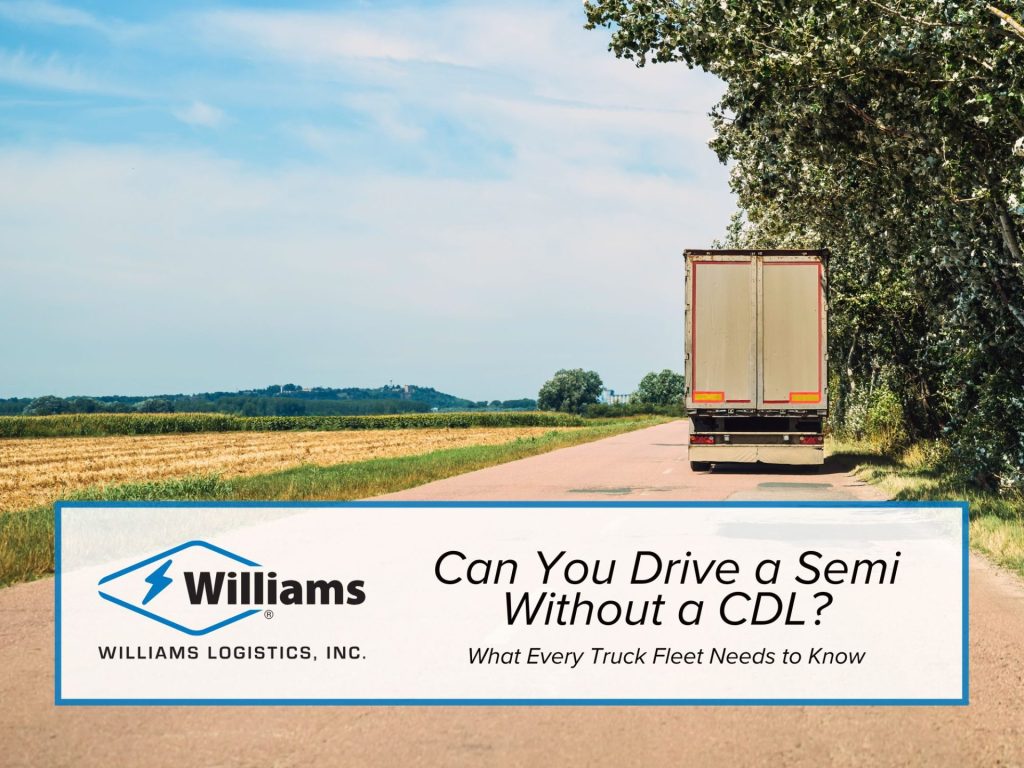At Williams Logistics, ensuring compliance and safety on the road is our top priority. A common question we hear is: Can you drive a semi without a CDL (Commercial Driver’s License)? The answer is nuanced, with critical legal implications for drivers and carriers. Here’s what you need to know about driving a semi truck without a CDL, the few possible exceptions, and the risks involved.
What Is a CDL and When Is It Required?
A CDL is a special license required to operate commercial motor vehicles (CMVs) in the United States. According to the Federal Motor Carrier Safety Administration (FMCSA) and most state laws, you must have a valid CDL to drive a semi truck if:
- The vehicle has a Gross Vehicle Weight Rating (GVWR) of 26,001 pounds or more.
- The combined weight (truck and trailer) exceeds certain limits.
- You are transporting certain types of cargo, such as hazardous materials, or carrying more than 16 passengers.
When Can You Drive a Semi Without a CDL?
There are only a handful of situations where a CDL is not required:
- Private Property: You do not need a CDL to operate a semi wholly on private property not open to public travel, such as a farm, construction site, or within some business lots.
- Personal (Non-Commercial) Use: If you own a semi for personal, non-commercial use and it is below the federal and state weight thresholds, a standard driver’s license may be sufficient. However, once you use the truck for any purpose considered “commerce” (including maintenance runs, repairs, or moving goods that could be sold), a CDL is required.
- State-Specific Exemptions: Some states and situations—such as certain farm vehicles, emergency responders, or active-duty military—may have limited CDL exceptions but these are narrowly defined.
If you are ever unsure, always verify your state’s specific rules and the FMCSA guidelines to ensure compliance.
What Are the Risks and Penalties for Driving a Semi Without a CDL?
Operating a semi on public roads without the required CDL is illegal and can lead to steep penalties, including:
- Hefty Fines: Fines for drivers typically range from hundreds to thousands of dollars. Even employers who knowingly allow unlicensed drivers to operate their trucks may be fined $10,000 or more per violation.
- Criminal Charges: In most states, driving a commercial vehicle without a CDL is a misdemeanor, carrying up to six months of jail time.
- License Suspension: Conviction can result in a one-year (or more) suspension of driving privileges, and repeat or major violations may lead to a permanent ban from operating commercial vehicles.
- Job Loss and Civil Liability: Operating without a CDL may void company insurance policies and result in termination or civil liability in the event of an accident.
- Compliance Audits: Carriers are responsible for ensuring all drivers have valid CDLs; audits and inspections can lead to additional fines and business restrictions.
What If You’re Caught?
If you’re pulled over or involved in an inspection checkpoint and cannot produce a valid CDL (or the proper endorsements), authorities may ticket you on the spot and possibly impound the vehicle. Courts take these violations seriously, given the public safety risks posed by large commercial vehicles operated by unqualified drivers.
The Bottom Line
You cannot legally drive a semi truck on public roads without a CDL, except under very limited circumstances. CDL requirements exist to ensure that only trained, knowledgeable drivers are behind the wheel of these large, complex vehicles.
At Williams Logistics, we’re committed to upholding safety and compliance for our fleet and our drivers. Always check the FMCSA and your state DMV guidelines before operating any commercial vehicle, and never take chances with licensing requirements. It’s your livelihood—and the safety of everyone on the road—at stake. If you have questions about CDL requirements or want to know more about compliance, our team is here to help every step of the way.
